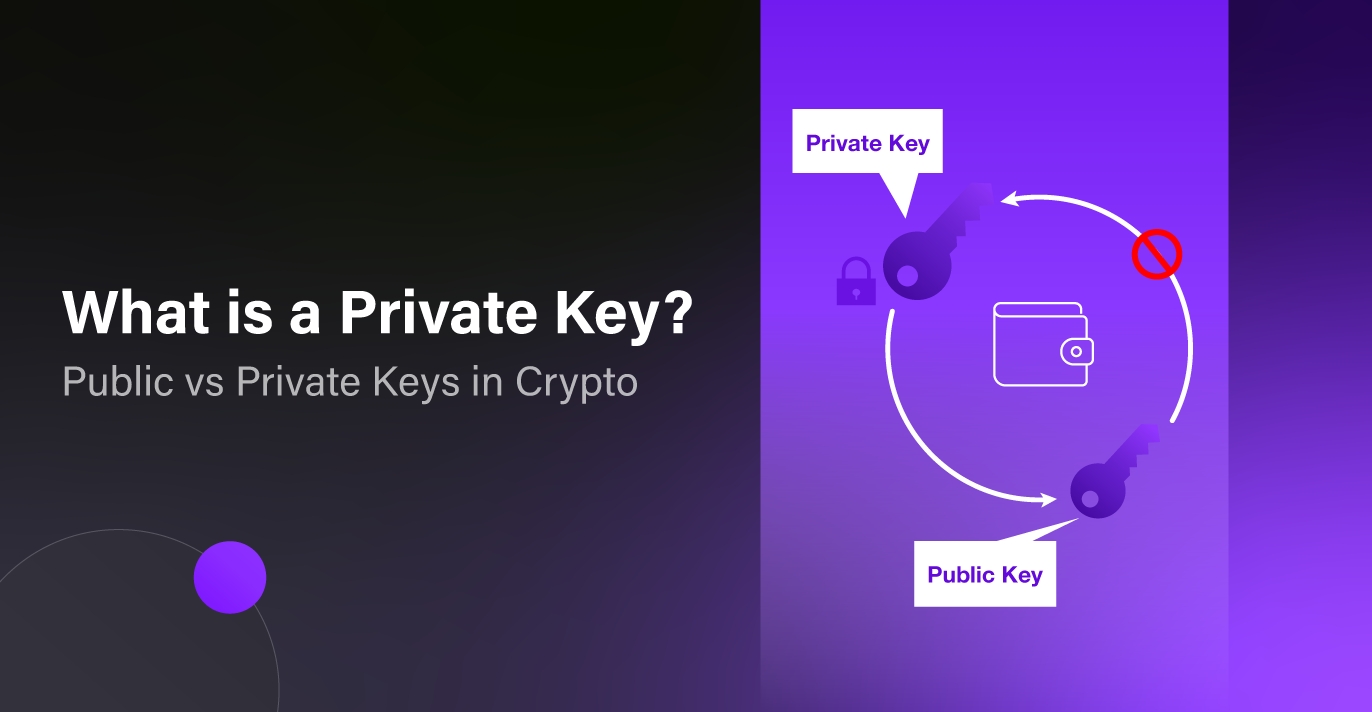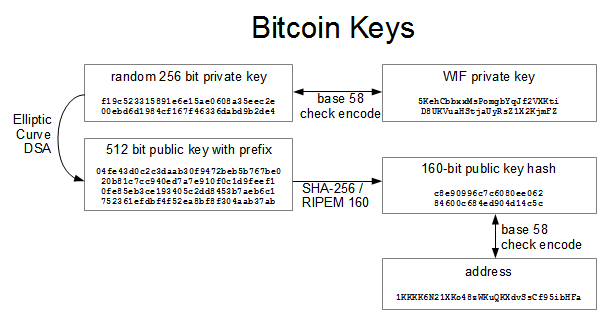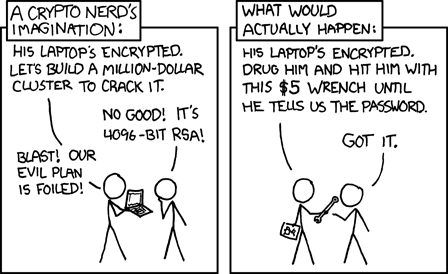What is a Private Key? Public and Private Keys in Crypto: How Bitcoin Private Keys Work
2024/05/02 11:55:15
What is a Private Key? Public and Private Keys in Crypto: How Bitcoin Private Keys Work
In cryptography, a private key would be a secret code with a long number, similar to a password. It was used to sign cryptocurrency transactions and prove ownership of coins or a blockchain address.
A private key is fundamental to the functioning of cryptocurrency, knowing how to keep it safe is a vital part of protecting yourself from theft or loss of funds.
In short:
• A private key is a secret cryptographic code that is used in cryptocurrency.
• A private key is a randomly generated number with hundreds of digits, usually represented as alphanumeric strings.
• Your crypto wallet consists of a public address and a private key. Anyone can send cryptocurrency to your public address, but funds can’t be moved from an address without your private key.
• Private keys must be kept safely. It is your final control and ownership of your cryptocurrency and makes a transaction. It’s very important to never lose your private key or let anyone else know it.
The digital keys and addresses associated with cryptocurrency control virtual tokens. Public addresses can be used by anyone to deposit tokens. Even if a user has deposited tokens in their address, they will need the unique private key to withdraw them.
Private keys come in a few different forms which can be expressed as a string of characters. In base-ten notation, it would be hundreds of digits long and take years to crack a private key by brute force. These days, most wallets further abstract the private key into “Seed words” or "Seed phrase". For example, a phrase of 24 words or random words that allow you to easily recover your wallet.
A complex mathematical algorithm creates the public key from the private key, and it is practically impossible to reverse the process. Another algorithm creates a receiving address from the public key. Think of the address as a postbox, and the private key as your key to your postbox.
The postman or any passerby can post letters in to the postbox, but only the person with the key can open the postbox and get the letters and packages inside. It is important to keep the key safe so that no one else can take the mail. If the key is lost or stolen, then anyone could access the mailbox.

How do the two keys work? This diagram shows an example of a Bitcoin private and public key. In daily usage, the 256 bit private key is base 58 encoded in to the WIF private key, and the public key is derived from the private key using the mathematically elliptic curve cryptographic algorithm and then further encrypted with SHA-256 in to a 160 bit public key hash and then encoded in to base 58 to become the public bitcoin address. It is computationally virtually impossible to derive the private key from the public address. In fact, even with the world’s most powerful supercomputer, it would take more than 3.3 Decillion years to crack one Bitcoin private key. That’s 3,300,000,000,000,000,000,000,000,000,000,000 years!
Why Are Private Keys Important?
Private keys are used in most cryptocurrencies, such as Bitcoin or Ethereum, to secure your funds. Your private key is the only thing that proves to the outside world that you own the cryptocurrency account or wallet. If someone else knows your private key, there is nothing stopping them from emptying your wallet.
The risks associated with private keys include loss and theft
If you are managing your own cryptocurrency wallet, the only way you can lose your coins is by losing your private key or someone discovers it and steals your coins.
These are some of the ways you can lose your private key:
• Forget where you hid it after writing it down - If you’re not careful, you might easily misplace the piece of paper you wrote your random number down on. And you can no longer access your crypto funds.
• It becomes damaged or destroyed - A written down private key can easily become damaged or destroyed by fire or flood. Pets or children may eat it by accident.
• Throw it away by accident - whether written down or stored offline on a device, many people have thrown away their private key by accident. One British man accidentally threw away his hard drive containing the private key to 7500 Bitcoins worth $280 Million dollars.
• Delete it - If you saved your private key on your computer, it’s very easy to simply forget it and then restore or wipe your hard drive or save over the file during routine cleanups.
Apart from accidental loss, there are a wide variety of scams and thefts that unscrupulous criminals may use to relieve you of your private key.
• Computer viruses - Hackers write malware and viruses that scan the victim’s computer for cryptocurrency private keys and then steal the coins.
• Inside man - People often make the mistake of keeping their Private keys stored in “The cloud”. These have been stolen by systems administrators who have access to data stored on the cloud server.
• Kidnap and extortion - A hardened criminal gang may simply kidnap you or a loved one and threaten to harm them or torture you until you give up your private key.

xkcd.com
The best way to keep your private key safe is to write it down and keep it somewhere where you won’t forget it, and it won’t be destroyed by water or heat and where no one apart from you will ever find it. After that, do not ever tell anyone you own cryptocurrency, or they may try to steal it or extort you.
What is a Public key?
Public-key cryptography (PKC) employs asymmetric encryption to verify the authenticity of data. PKC was initially used for encrypting and decrypting messages on standard computers. The technology that cryptocurrency transactions rely on for encryption and decryption is Public Key Cryptography. This technology would not be possible without trapdoor functions. Trapdoor functions are one-way mathematical functions that are easy to solve in one way, but nearly impossible to crack in the reverse. Even if it were possible, it would take a supercomputer thousands of years to reverse engineer these functions.
A cryptographic code that allows you to receive cryptocurrency transactions is called a public key, used to send coins into a wallet. This code is paired with a corresponding private key, which is needed to unlock the transaction and prove ownership of the cryptocurrency. The public key is usually an address, you can share it without worry. For example, many content creators and charities post their crypto addresses' public keys online to accept donations. While anyone can donate, only the owner of the private key can unlock and receive funds.
In general, a bitcoin public key that starts with the number 1 would need a single private key to access the funds. There is another version though, called a multi-signature public key, that starts with the number 3. This type of key would require more than one private key to grant access to the funds.
What Does It Mean to Digitally Sign Transactions?
A transaction request prompts the usage of a private key in order to sign the transaction and provide mathematical evidence that the Bitcoins (Or other cryptocurrency) come from the owner. This is referred to as a signature, and it prevents the transaction from being modified by anyone else. Once a transaction is signed and validated, Bitcoins are sent to and received by the other wallet; at this point, the transaction becomes irreversible.
How Do You Sign a Message with a Private Key?
The process of signing a message can vary depending on the cryptocurrency and the wallet software you use. Some cryptocurrencies and wallets don't offer the option to sign messages.
Signing a message to your cryptocurrency address proves that you are the owner of the funds that the wallet holds. It also confirms that you control the private keys of that particular address, this provides further authentication than simply providing an address or transaction information through blockchain explorers where all information is public.
Consult your wallet software's documentation to determine the precise process for your specific wallet and cryptocurrency. If the wallet you use does not permit message signing (digital signature), but does enable the export of private keys or wallet seeds, it might be possible to import those private keys or seeds into another wallet program that does offer this capability.
What is a Bitcoin Address?
A Bitcoin address is a single-use token that acts as a virtual location to where cryptocurrency can be sent. Similarly to how fiat currencies can be sent to email addresses, people can send cryptocurrencies to Bitcoin addresses. However, Bitcoin addresses are not meant to be permanent, but only for use in one transaction. Unlike a Bitcoin wallet, a Bitcoin address cannot hold bitcoins. Though some people think a bitcoin wallet address and public key are the same, they are actually different. However, they are mathematically related--the wallet address is a hashed version of the public key.
The alphanumeric string that is the address consists of 26-35 characters. This is the public half of an asymmetric key pair. The standard format for a Bitcoin address is P2PKH (pay to public key hash). Addresses are generated by Bitcoin wallets through cryptographic operations: The software generates a private key through an asymmetric signature algorithm and then derives the public key from the private one.
Bitcoin's beginnings saw users sending the currency to IP addresses. This was a convenient method, but it left users vulnerable to man-in-the-middle attacks. To increase security, the Bitcoin address was created to make Bitcoin more secure.
• How to Use Your Public Key to Send Bitcoin
The public key can be utilized for sending cryptocurrency into a wallet. It is similar to how someone would provide their routing number and checking account number for direct deposit; however, it does not enable them to log in or withdraw money from the account. Think of the public key as the mailing address. Anybody can look it up and send cryptocurrency to that public key.
• How to Use Your Public Key to Receive Bitcoin
The public key is your bitcoin address. In order to receive cryptocurrency, you can provide it to anyone who might want to send bitcoins to your wallet. All public keys are searchable on a block explorer.
Where Should You Store Your Private Keys: Keeping Crypto Private Keys Safe
It is ill-advised to store private keys in an online environment, via email, or in the cloud, as these are the most vulnerable to being hacked. Many people take screenshots of their private keys, which are often stored online through photo album syncing. This creates a security risk that should be avoided at all costs. But with so many options available, which is the most secure way to store private keys safely? One of the first considerations is whether you want to use a hot or cold wallet.
Cold and Hot Wallets
Hot wallets are an attractive choice for people looking for fast access to their crypto assets and for using digital currency for everyday purchases. However, it’s important to be aware that hot wallets, like the web browser plugin Metamask, can be susceptible to security threats if the user’s computer is infected with malware. If top-notch security and control of your private keys is a priority, cold wallets are the better option, this method known as cold storage. Cold wallets offer offline storage of your private keys, so as long as your computer isn’t connected to the internet, they should remain secure. Be sure to consider the quality and security of the wallet you use, as hackers are always on the lookout for vulnerable ones in order to gain access to your private keys.
Should You Trust a Custodial Wallet?
A third-party service that allows users to store cryptocurrency, similar to a bank, is known as a custodial wallet. Examples of custodial wallets include exchanges such as FAMEEX or Coinbase. This type of wallet enables users to bypass the complications of private key management by entrusting the security to the company offering the custodial wallet. However, there are some disadvantages. For example, custodial wallets can be compromised by hackers or phishing scams. They can also be seized or frozen by legal authorities or by the company itself. That’s not to say that self hosted wallets are impervious to phishing or hackers, they are not.
The best policy is to decide what type of wallet meets your personal level of technical ability and need for convenience. You can also use both self managed and custodial wallets at the same time. This is not an either, or, choice.
Securing Your Root Seed Phrase
As cryptocurrency users, we know that our coins and tokens are only as secure as the infrastructure we put in place to protect them. We put a lot of effort into choosing a safe place to store our farms and have the best kind of wallet — but some forget one of the most important parts – securing your root seed phrase.
In the event of catastrophic loses, malicious hackers, and human error, digital currency wallets are vulnerable to theft and fraud. The root seed phrase is the only way to restore a wallet and its balance. Therefore, it is essential to keep it secure.
Public and Private Keys Control Your Crypto
Understanding how public and private keys interact is essential to grasping how cryptocurrency transactions occur. Possessing cryptocurrency really means holding a private key that demonstrates you own it. Everyone can confirm that the cryptocurrency is held by you with the help of a public key, as it is recorded on the blockchain.
Is there the best way to store it? The choice between keeping your own keys or delegating the responsibility to a custodian relies on your outlook, risk attitude, and other considerations. In case you control your personal keys, think about using current HD wallets for managing your private keys, and remember that you must never impart them. If you select to have a custodial answer, like an exchange service, guarantee it is a dependable company that pays attention to security regulations.
FAQ
• What happens if I lose the private keys to my cryptocurrency?
As a crypto investor, safeguarding your private keys is paramount. Private keys are the only way to manage and access cryptocurrency stored in wallets. Without your private key, you will be unable to access your funds. It is therefore essential to store your private keys in a safe and secure place. The best way of achieving this is to use a hardware wallet. Hardware wallets securely encrypt your information and prevent malicious actors from gaining access. Additionally, remember to never lose your private keys. Whilst there is still a possibility of recovering funds using your seed phrase to find the private key back, it is far better to practice caution and keep your private keys secure.
